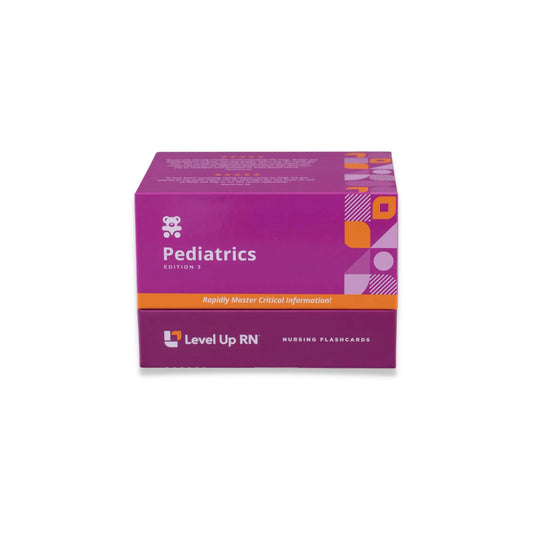Hi, I'm Cathy with Level Up RN. In this video, I will begin my coverage of renal system disorders from our pediatric nursing flashcards, and specifically, I'll be talking about nephrotic syndrome. And then at the end of the video, I'm going to give you guys a little quiz to test your knowledge of some of the key points I'll be covering, so definitely stay tuned for that. And if you have our flashcards, go ahead and pull out your flashcard on nephrotic syndrome so you can follow along with me. And pay close attention to the bold red text on the back of the card because those are the things that you are likely to get tested on in nursing school.
Nephrotic syndrome is a kidney disorder characterized by the massive loss of protein in the urine. So with this disorder, we have damage to the glomeruli, which are the filtering units in the kidneys such that the glomeruli become more permeable, and this allows protein to pass in the urine. So this damage to the glomeruli can be caused by a number of things such as an immune disorder, a genetic defect, or infection, just to name a few examples. So a key protein that we are losing in the urine is albumin, and albumin is essential for keeping fluid in the bloodstream. So if we are losing a bunch of albumin in the urine, then that means we don't have a lot in the bloodstream, and that's going to cause fluid to leave the bloodstream into the surrounding tissue. So a key symptom of nephrotic syndrome is edema. This includes periorbital edema, so swelling around the eyes, as well as swelling of the abdomen, and peripheral edema as well. Other signs and symptoms of nephrotic syndrome include weight gain, fatigue, and decreased appetite. In terms of labs, a urinalysis will show massive proteinuria, so over 2+. In addition, the patient's urine will appear frothy. This is due to the high protein content in the urine. So our cool chicken hint to help you remember this is to think of nephrothy syndrome. And this will help you to remember that nephrotic syndrome can cause frothy urine. And then in terms of blood levels, we would expect a low level of albumin because we are losing so much in the urine. And then hyperlipidemia, which is where we have high cholesterol levels, is also very common with nephrotic syndrome.
Nephrotic syndrome would be diagnosed with an ultrasound or a kidney biopsy in some cases. Treatment includes the administration of corticosteroids such as prednisone to decrease inflammation in the kidneys, reduce the amount of protein that is lost in the urine, and increase urine output. Other medications that may be prescribed include diuretics as well as 25% albumin. So albumin would be administered through the IV route and helps to draw fluid back into the bloodstream and reduce edema. And then statins may be prescribed to help reduce cholesterol levels. In terms of nursing care, we want to closely monitor our patient's intake and output as well as their daily weight and abdominal girth. We should implement fluid and sodium restrictions as ordered. And then it's going to be really important that we protect our child's skin from breakdown. So with severe edema, this causes the skin to become very fragile, almost like tissue paper in severe cases, so we definitely want to handle our child with care. And then we also need to protect our child from infection as corticosteroids increase their risk for infection.
All right. It's quiz time, and I've got three questions for you.
Question number one. Nephrotic syndrome will cause excess blank to be present in the urine.
The answer is protein.
Question number two. How will the urine appear for a patient with nephrotic syndrome?
The answer is it will appear frothy due to the high protein content in the urine.
Question number three. What medication class is used in the treatment of nephrotic syndrome to decrease inflammation in the kidneys and reduce the amount of protein lost in the urine?
The answer is corticosteroids.
All right. That is it for this video. I hope you found it to be helpful. Take care, and thank you so much for watching.


